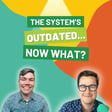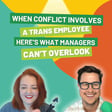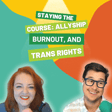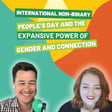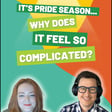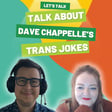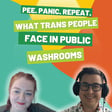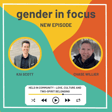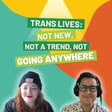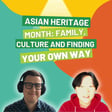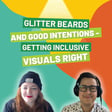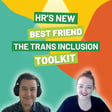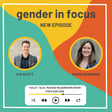Introduction to 'Gender in Focus' Podcast
00:00:02
Speaker
This is Gender in Focus. I'm El and each week I sit down with the president of Trans Focus Consulting and all-round gender diversity genius, Kai Scott. I get to ask all the questions you've ever wanted to ask about how to make the workplace and the world a better place for trans and non-binary people.
00:00:20
Speaker
Let's get into it.
Challenges Faced by Allies
00:00:23
Speaker
In today's episode, we are getting into a very common concern that allies of trans and non-binary people share with us in hushed whispers.
00:00:32
Speaker
They are scared of getting something wrong, unknowingly, and then having people mad at them. As a result, allies hesitate, avoid, and are often quiet.
00:00:42
Speaker
This doesn't go away with a simple thought of, don't worry about it. We get into the root cause and provide practical tips to move through these feelings into a more productive place.
00:00:53
Speaker
ah We share our own allyship stories because we're all figuring it out together. So I'm really excited to get into this topic with you, El How are you doing? I'm doing very well, thank you. How are you doing? Awesome.
00:01:07
Speaker
Fantastic. Yeah. Really excited to delve into and hopefully demystify here fear of getting it wrong.
Fear of Mistakes and Inaction
00:01:15
Speaker
It's a good topic today. i feel like this is the one that I just ah myself included.
00:01:20
Speaker
It's like that squirming feeling that dread of getting things wrong. Well, I think to some degree, we'll have this level of perfectionism. So the idea of getting anything wrong, but then throw into the mix the way that it can affect other people. Most people don't love that feeling. Oh, not at all.
00:01:38
Speaker
We've talked before about how this fear of getting it wrong can really like hold us back from fulfilling our potential as allies. um So how have you seen that show up Oh yeah. I mean, i have i have a big heart ah for allies. I'm an ally myself for other equity groups or even within my community. um But I will say that even though it seems like it's coming from a good place, it has this unintended negative consequence, right?
00:02:11
Speaker
And I see that in my own story as well, where, you know, you think we think we're expressing a caring by kind of removing ourselves from a situation or ah not saying something because we don't we're not quite sure if we should say something or how to say it or what to say, like, you know, so many questions.
00:02:32
Speaker
And we kind of get stuck in our own heads in a way that we are not present to the situation with the person in front of us. And we're also not able to take action.
00:02:42
Speaker
We kind of just like get frozen in place and... And then unfortunately, we're also not able to get to know somebody in a more like a deeper way.
00:02:54
Speaker
So it prevents all these things from happening. It also prevents us from helping those who perhaps are but are struggling on their journey of being respectful towards trans and non-binary folks. and so you know has all these kind of yeah as i said negative consequences in many different directions.
Personal Experiences with Allyship
00:03:12
Speaker
ah And so that's where it's really sad that this happens, even though it's a pretty common occurrence, but why we're pretty motivated to help people, kind and ourselves included, to kind of walk through that.
00:03:25
Speaker
It's definitely such a familiar feeling. And I'll say, from moving from Britain to Canada, ah my knowledge of Indigenous communities in Canada was severely lacking right through lack of education at home and also not really understanding the impact, like so especially from the country that I'm from, the actual, the massive impact that has had.
00:03:48
Speaker
That feeling of, I really don't want to get this wrong because it has had such massive impacts. So I could definitely feel that like that stress and that tension of wanting to get things right because I care, but then feeling like,
00:04:02
Speaker
I just don't want to say anything then in that case, because I don't want to show up in the wrong way. So for allies of trans and non-binary people, I have a lot of love for that that fear because I know what that's like and I think most of us probably do to some degree, but it really does hold us back from showing up at all then in that case ah and from what you've seen, main fear that a lot of people have when it comes to ah trans people and and what their mistakes, will what will happen
Productive Guilt in Allyship
00:04:31
Speaker
if they make a mistake. Yeah.
00:04:33
Speaker
Usually we mentally play out ah bit of a story that we think will happen. I do this myself. I'll say, okay, I can see myself in the future saying something and then maybe a a facial expression on the other end. like You can almost visualize this yeah too, right? It's just like, okay, and then this is going to happen and then this, and then they're going to say something or somebody else might say something, you know and um and you know they're going to be mad they're going to judge me and say I'm a horrible person um you know on and on and like you can be quite elaborate in this story um where many different threads come up in and and then suddenly like we're like my my shoulders are up to my ears you know my heart is racing my stomach is a knot and um but I'm still just like me with me right like it's yeah nothing's actually happened nothing's actually happened
00:05:31
Speaker
That person, you know I have not connected with the person across from me, if you know they're across from me or maybe you know maybe in the future there might be, but just like, yeah, it's ah it's not based in reality, right? And it's not to say that no harm can be done, um but it's it's important not to anticipate it, right? In a way that that lock locks us up and can prevent us from actually growing and learning and understanding what's happening for somebody And that might include some missteps along the way, right? And that there's actually value to those. Not to say we want to use missteps as a basis for learning.
00:06:12
Speaker
ah We can learn without doing missteps. But if they do occur, like it is actually really important that we pay attention and not kind of be absorbed in our own, like, I can't believe I did this. Right.
00:06:28
Speaker
even though that's a very natural response. ah And I think a lot of people have that type of response to show that they care.
The Impact of Over-Apologizing
00:06:35
Speaker
ah so it's like if like, I get the psychology of like like being very elaborate in one's apology or ah you know, i can't believe I did this, you know, you must think I'm horrible, you like kind of um flogging themselves, right, on display to that person to show just how sincere.
00:06:55
Speaker
And the thing is, though, that um if you place yourself in that situation on the receiving end of that, it is very kind of like, whoa, that's a lot of energy, right?
00:07:06
Speaker
coming at somebody and in a way that some people might even block it's it's so much, right? And difficult to manage. Or some people then might kick into, i got to take care of this person who just made a mistake. you know, so it's just like these weird dynamics.
00:07:22
Speaker
But if somebody can stay present with the person, that is actually a greater sign of caring than this more like show of caring, um which is a bit counterintuitive. So there's a bit there to unpack, to realize what we're doing, and to be to make ourselves um conscious of that so that we can choose other ways of of showing up with with people, even if we have made a mistake.
00:07:49
Speaker
ah But a common stressful thought that people have is my mistakes will hurt trans people. They've already made a foregone conclusion that every single time they make a mistake, trans people will be hurt.
00:08:01
Speaker
And there's a lot there that can be unpacked and not all of it is exactly true. When you say not all of it is exactly true, what do you mean? Yeah, this is where we do what we're calling stress-free allyship because I feel i I see the value in people being more relaxed to be able to be effective allies.
00:08:26
Speaker
And with the my mistakes will hurt trans people, um people may not realize that not every single time
Concept of Stress-Free Allyship
00:08:33
Speaker
a trans person may be upset. ah You know, it depends on the day, the situation, what's happening.
00:08:41
Speaker
Sometimes people's intention can be a factor in it. um some A lot of the times trans people can tell people's intentions, right? By the way they said it you know, that they're apologizing, all these factors.
00:08:55
Speaker
And so that trans person might not get hurt anymore. And not to take away from the fact that some trans people will be hurt, right? But it's just not painting everybody with the same brush and automatically assuming harm.
00:09:11
Speaker
It's being present to whether or not there is harm and then figuring out a way how to address that harm, right? So there's a few steps to be available for as an ally, as a supporter, ah rather than just, you know, stamp, hurt, was done, end of story. You know, I determine, not the other person, right? So it's it's just realizing that dynamic and being available to to what's there.
00:09:38
Speaker
you you mentioned about that kind of laboring the apology and I know I've talked before about how that was for a while that was my kind of initial response to making a mistake and and it wasn't until as you said it wasn't until somebody did it to me after the mistake that they had made that I realized how annoying it is to be on the receiving end of that it's exhausting to be ah kind of hurt by something or I wasn't actually particularly hurt by it it was just more of a calling someone in situation and the apology that went on for 15 minutes made me start getting annoyed about the situation and so there there is uh there is something to be said for just owning it and not not laboring it but I wanted to then ask you what that actually looks like in terms of processing a mistake that's been made So what what do we do instead, right? I mean, certainly acknowledging and correcting the mistake is part of it, but that may not change the the guilt that one feels. And I think it's important and it's okay to feel guilty, right? And then what do you do with that guilt, right? It's not like you can be like, okay, I shouldn't feel guilty.
00:10:47
Speaker
That never really helps, right? Yeah. Oh, I didn't think about that. You know, it's like guilt is there. What do I do with it? It's really helpful to go and talk to other folks, right? Who perhaps on their own allyship journeys and that you can just debrief about that be like, I felt like such an idiot and then this happened and then I said that and...
00:11:08
Speaker
you know, you can really just like unpack it with somebody and express the feelings that are coming up or the disappointment or the whatever and name it and, you know, ah have it be, you know, validated by somebody, right?
00:11:23
Speaker
It's just not with the person that you made a mistake with, right? And so it's just figuring out where to place that kind of discomfort or challenge as a way to help move through it. Because once you kind of um talk it through, it really lifts the weight of that moment in a way that allows you to be, again, more available with that person and not so anxious.
00:11:46
Speaker
Because oftentimes if that guilt or whatever, the remaining feelings, those stay and then they still interact when you come back in contact with that person.
00:11:57
Speaker
Or you might just all ah just avoid that person altogether, right? Like some people adopt that as a strategy, and but then oftentimes that other person feels that and are like, oh, why are they avoiding me, right? right And that can also have an impact, right? So it's just all this challenge. But if you process it with somebody else, there's a lot of value to be able to come back to that in a more natural, relaxed way ah that is more productive, right?
Reframing Guilt and Values
00:12:26
Speaker
I think like there is such a, ah you can reframe guilt or at least use guilt as a tool because like one of the things that has helped me when I've made one of the many mistakes I've made is seeing guilt as way for me to see where my values are.
00:12:43
Speaker
And so if I did something that has made me feel guilty, that tells me immediately that I have missed integrity or i have missed a value of mine and that's a great lesson to like it teaches you what you what you like and what you don't like it teaches you values about yourself that maybe you didn't know or that you didn't realize to to what degree so it's I use it anyway as a tool it's a horrible tool I wish it's a very uncomfortable tool yeah but it is a tool if you want it to be you can use it and then that can then teach you to not make the same mistake again or to be a bit more mindful about it but not in a way of flogging yourself and being furious with yourself not not as a way to induce shame but as a way to encourage a change of behavior or to even just understand yourself better think oh yeah Absolutely. And there's a gentleness to it as well. I like what you're describing.
00:13:33
Speaker
um It's, you know, not blaming and shaming, but recognizing it's a catalyst for change. It's, read you know ringing a little bell that you can respond to or not, but there's benefit to oneself in exploring that a bit further.
00:13:49
Speaker
And then we're not so avoidant of guilt, right? Because You know, I mean, fair enough. You're right. It is a difficult, uncomfortable emotion. And, you know, but there's there's there's something there that is valuable to everybody involved. So might as well go take a look, you know.
00:14:07
Speaker
For sure. If you want to.
The Power of Listening and Presence
00:14:09
Speaker
Yeah. yeah In a previous episode, you talked about the discomfort of just sitting with someone when they're upset and that we really shy away from that.
00:14:18
Speaker
And it's especially hard when we're the ones that have caused that upset. Can you talk about that? Because you you talked about it really beautifully after a recording we weren't even recording when you said it so okay okay I love it yeah record from the vaults yeah it's yeah it's so true hey um and I have my own experiences of that and I will say there's such a beauty in being together with somebody I think oftentimes we're solution oriented in our society we're like okay I've done something and now I gotta like fix it
00:14:56
Speaker
like action, you know you know whatever that might be for whoever, right rather than just sitting and listening. And that is, we we don't develop listening skills a lot, at least not intentionally in our society. And so they can be underdeveloped. It might be feel like a stretch to listen. Right.
00:15:19
Speaker
um And, you know, we also have to, we're just talking about guilt, but still feel the guilt of, you know, when they talk about the impacts on them about what was said or done or whatnot. But just allowing people the space to talk as much or as little or, you know, whatever they want to do ah is a very powerful thing.
00:15:42
Speaker
It doesn't feel like very action oriented or producing outcomes, quote unquote. ah But people get to identify, I will say, especially for trans and non-binary folks, oftentimes issues are immediately dismissed.
00:15:58
Speaker
Like, that's not a thing, you know, sorry you feel that way, you know, like very weird um responses. Yeah. But rarely are trans and non-binary folks given space to talk about and to sometimes they even have to like actively think through, they like they feel the impact, but then have to put words to it.
00:16:20
Speaker
And for somebody who is able to hold that space, it actually is of tremendous value to the trans and non-binary person. Obviously, you'll learn in the process as a person having made a mistake.
00:16:33
Speaker
But there's just so much there. And that includes people yelling or maybe having a heightened response, even a response that might feel maybe because we don't have the full understanding, it might seem out of place or like overblown, right?
00:16:53
Speaker
And even if somebody is yelling, recognizing it, probably like, of course, you as the person who made the mistake, you're part of it, but it may not be fully about you. Right? Right. I was actually going to ask about that. I was going to redirect something because that's such a key part, right? That when somebody's having a big response is almost certainly not exclusively about you or what you've said.
00:17:16
Speaker
No, no. And it feels like that because of course it's directed or maybe even around you. Maybe it's not specifically directed, but you're there, right? And you're feeling it.
00:17:27
Speaker
It feels like a lot. But if you're able to hold the space, It's somebody solid to receive that.
00:17:38
Speaker
It's not that you have to take ownership for all of it, right? Because again, it might most certainly is not 100% about you.
Continual Learning and Growth in Allyship
00:17:45
Speaker
It's probably a series of things, right? ah Particularly for trans and non-binary folks, keep things keep repeating themselves. So you might be the safe place where that all comes to a head.
00:17:57
Speaker
And if you're able to listen to it, obviously we all have our own things. So if it doesn't feel safe or, you know, on a whole number of things, obviously you can, you know, can be like, Hey, can we continue this conversation in a minute? I'm not feeling up to it. You can say that that's okay.
00:18:14
Speaker
But if you are able to hold that space, there's actually um somebody is able to come out the other end of that in a way that has healing and, you know, provide some sort of insight and,
00:18:26
Speaker
ah for for everybody involved. so And as long as you can hang on to the fact that it's not 100% about you, that you have some percentage responsibility, but there's something else going there, and that there's a there's a beauty to that, even though it's kind of really, wow, it's big, but there's also tremendous value and benefit.
00:18:49
Speaker
I want to ask you my favorite topic, mistakes that the people in front of me have made. So can I ask you about ah mistakes that you've made or examples that you've got of ah where this has kind of shown up for you?
00:19:02
Speaker
Yes. Assuming there are any in your knowledge. wow. Yes. I've never made mistakes so ever. um Yeah. So I will say,
00:19:15
Speaker
I mentioned it briefly earlier on that I am an ally to people in my community. So i as a trans man, I'm an ally of non-binary folks, right? Or I'm an ally to two-spirit folks.
00:19:29
Speaker
And then I also have experiences on other equity topics, whether they be race and ethnicity, disability, women's issues, the list is long. I will say, folk and I think sometimes cisgender people are surprised that trans people also make mistakes with other trans people.
00:19:49
Speaker
Like, the expectation is that we've got it all dialed 100% of the time with each other, which we do not. Little behind the curtains secret here. um Right. Inside scoop. You I misgender myself on a regular basis. Right?
00:20:05
Speaker
There's another that's another, that's like a deep cut. Like, that's... It's such a thing. oh my gosh. Yeah, even ourselves to ourselves. ah But there is one particular story about um I, about two years ago, ah really failed two-spare person.
00:20:25
Speaker
i won't go into the details to keep those private, but I just was not able to show up in a way that was needed at a particular moment. And fortunately, this person told me that You know, oftentimes trans and non-binary and two-spirit folks, they won't don't feel safe, confident, whatever the case may be. They don't share that something's gone out. So I was like just thankful that anything was shared as a step number one.
00:20:53
Speaker
But of course, I went through my reactions, you know, as somebody... who provides this training of like how to be an ally, ah a you know, felt deep amount of shame as it wasn't just a small thing. It was a big thing. And i doubted my capabilities. I wanted to melt into the floor and preferably away into the mountains, never to be seen again. get a cabin in the woods stay there.
00:21:23
Speaker
were it's over. I'll just chop some wood. Nobody's going to connect. It was a big reaction. I was like, so I gave myself a moment. to And of course, I did not share this reaction with this person. It was to myself, right?
00:21:40
Speaker
But then realized very quickly that in showing up with that person to hear what the impact was, I needed to be a solid person.
00:21:51
Speaker
Because when I kind of have this big reaction and you know melt into a puddle, like there's nobody there to share information with, right? So it's just like, you just kind of have this ghost of a person.
00:22:05
Speaker
um And that's not helpful to that person who's trying to share information about how I impacted them negatively. So i was like, okay, I got to be solid. i got to listen.
00:22:17
Speaker
i got to receive. I've got to, you know, ah active listening, you know, reflect back what I heard from this person. And i got to come with my, ah be willing to listen to what they think is important to mend the relationship, ah to account for my missteps.
00:22:37
Speaker
And then I want to come with my own ideas of what I'm going to do, ah particularly to prevent this from happening again, like on and on. it i so is There's no value and could even be a bit harmful for me to totally, you know, just go on about the apology, that approach or, know,
00:22:55
Speaker
you know avoid it or whatnot. And what I will say is that ah going through that process, it wasn't pleasant, it was uncomfortable, it was difficult, um but it was good to talk through it in a way that, again, provided that person space.
00:23:10
Speaker
ah They were able to make a few connections of things beyond what happened. um And we just had, it was like a connecting moment. um I mean, I can't speak for them, but for me it was.
00:23:22
Speaker
um There was a bit of closeness um that was created. And it didn't stop my journey of two-spirit allyship from continuing. In fact, it deepened it. I realized i need to learn way more on this. And it was like a spark that I was like, I got to pivot this. Yeah.
00:23:42
Speaker
And I got to do my own journey. And as a result, because of that commitment or that decision, a bunch of things came in where I'm being invited to ceremony. I'm ah being invited to you know, a lecture. ah You know, things come across my feed. I say yes, you know.
00:24:02
Speaker
And so I just like have gone on a year and a half or two year journey and I'm not done. Right. Like it's. pretty much
Balancing Impact and Intention
00:24:12
Speaker
that ah But I now have way deeper understanding, by no means perfect, ah but now I know how to show up yeah even more than before.
00:24:24
Speaker
And so it's there's something to be said about, yes, missteps happened, and now is it going to be, going to just melt and nothing happens, or um is this a catalyst to that deeper journey?
00:24:39
Speaker
I really love the way you describe that kind of gratitude it towards having an experience that is a horrible, uncomfortable, and ah hopefully not and not an experience is going to show off again. yeah Like all of that is true, but also there is all this other stuff, this positive stuff that have come from it. And obviously it would have been better if that hadn't happened in the first place, but if it hadn't, yeah and if this person hadn't felt comfortable to share that with you, um really,
00:25:08
Speaker
in correcting you, they gave you a real gift of being able to keep learning and growing. I will say one other thing is that they were a bit surprised that, ah you know, I listened.
00:25:23
Speaker
I think they were prepared for something else. And i'm I'm sure that is because of past dismissing of issues or discounting. And so I think that's why i i i share this allyship journey with to inspire others to hold that space because it is so powerful and people may not be getting a lot of it um and that we play a pivotal role and it also returns agency to that person where agency is so frequently removed ah from trans and non-binary folks so in if something
00:25:58
Speaker
Because time and time in their surveys, the common response is that I don't ever want this to happen to other people. Like, yes, it happened to me, not great. But if if things can change going forward, then I'm really, that's a good thing, right?
00:26:15
Speaker
So that's key. Can I ask you, and I think this probably could be its own episode, but can I ask you, and and we have touched on it briefly in other episodes, but about ah impact versus intent.
Counterproductive Apologies
00:26:28
Speaker
And there's something else that you you mentioned in a previous episode that I want to ask you about that kind of ties into that, which is where you preemptively think sort of explain that you're going to make a mistake and you prepare other people for a mistake that's oncoming, even though you haven't actually made one yet.
00:26:46
Speaker
ah So I feel like those are yeah intertwined. Yes, yeah yes absolutely. ah So yeah, I'll start with the intent versus impact. In various communities, there's a discussion about what you focus on when missteps are made or challenges occur or discrimination. And certainly from ah legal perspective, it is like when there's human rights discrimination, so this is on the really like egregious side of harm. Mm-hmm.
00:27:15
Speaker
impact is what's focused on, right? Like, it doesn't matter the intention. If somebody is ah irreparably or, you know, a large degree of harm has been created, that's what's measured. Now, when we're on the more subtle or kind of smaller scale harm, ah that's where maybe there's a ah flip in that, right?
00:27:37
Speaker
Where intention can play a bit of a factor in the interaction. Now, depends on the person, We don't want to presume that our positive intention is gonna be what's enough, right?
00:27:50
Speaker
ah But as I was mentioning, trans people generally have a pretty good sense of having interacted a lot with folks and many missteps. They generally have a pretty good sense of who is trying hardest, but maybe just misses the mark and wants to keep trying, right? That's another key part of it. It's not like you kind of give up and be like, well, whatever.
00:28:13
Speaker
ah But like, want to keep going, right? Versus the the people who, you know, are just like, nah, this is not a thing. So people can and will have a lot more space for people who are trying their best.
00:28:27
Speaker
um And this is something very new to them, and they want to get it, but maybe need a little bit more time. Like people have a lot of time and patience for that. Most trans and non-binary folks do.
00:28:38
Speaker
um they feel very um encouraged and touched that people are making an effort, right? That comes across very clearly. So intention does play a very important role, right? And then, you know, the impact, there can be an impact, but maybe it's mitigated by the intention, right? So there's a bit of a balancing act.
00:28:57
Speaker
Now, again, it's the subtle side. Egregious side, impact is the only factor, right? Mm-hmm. Now, I will say that to your second question, some people, they say, you know, they kind of preempt their mistake, as you were mentioning.
00:29:15
Speaker
And, you know, when meeting somebody for the first time that, say, uses they, them pronouns, they're like, I'm going to mess up a lot, right? Right. And i get why people want to do that. they They think probably that they're going to soften the blow a bit, right, of that and also set, say, kind of signal, I i come in a good way, right?
00:29:36
Speaker
But unfortunately, there's a few things. There's the one, it can be annoying. to trans and non-fairy folks. like Just being honest here, it's like it's not just one person that says it. A lot of people say it.
00:29:51
Speaker
Also, i think people discount how much they're capable of. And if you kind of label yourself as somebody who's already going to make mistakes, you kind of like create a pathway mentally, even though you don't intend to, for mistakes to be made, rather than reapplying that energy to trying to be as conscious in the moment as possible.
00:30:15
Speaker
Now you don't always have to do that. Like as you get better with things, you can start to kind of let go of needing to pay attention. But for the initial period, I think it's valuable to have a little bit more being conscious with that person and, you know, just sparing that person that I'm going to make mistakes. Like, eh, I don't know. What do you think about that?
00:30:36
Speaker
What's your reaction? If you, if you've experienced that before. I mean, yeah it's bit annoying. That fear of getting it wrong ends up making it more frustrating for the people on the receiving end of that.
00:30:47
Speaker
So that would be what my view of that is. yeah It's actually better almost to try and maybe make a mistake, but just be seen to try and not not lead with the mistake.
00:30:59
Speaker
Because then that's all all I would think about is I'd be waiting for the mistake almost. Yeah, you're right. Or I see that some people could. Yeah, like kind bracing for impact, right? Because this has been preempted rather than, you know, it happening and addressing it in the moment, right?
00:31:16
Speaker
It's kind of like, ah you know, using the Nike slogan, just do it, you know? Yeah. very yeah you can And you can do it. That's for me. is always like with For me, it's about practice, right? It's the intentional application of focus and then really making a concerted effort rather than just being like, oh, I've covered everything now because I've said this thing, right?
00:31:42
Speaker
It's like, where are you going to apply your energy? Is it you know to to try to cover things up or or to apply the energy needed to make the change?
00:31:54
Speaker
Because it is our need to change. It's not the other person's, if that makes sense.
Stress-Free Allyship Sessions
00:31:59
Speaker
for sure. It's because we've been programmed in this way. And yeah, there's a bit of effort to deprogram.
00:32:06
Speaker
um But the journey is well worth it. Yeah. And also I think there's a ah degree of like people what to be seen as good, myself included, right?
00:32:20
Speaker
but're We're good people, you know? and But I think we're moving whether we're good or not to the side and just focusing on the nuts and bolts, the the practical stuff.
00:32:33
Speaker
And then you're not kind of going up and down emotionally based on what you're doing. You're just kind of steady, um My thing is like, everybody's good, right? You could trust that you are good. for sure I mean, everybody has their own conclusions and I respect those.
00:32:49
Speaker
ah But in my mind, everybody's good, trying their best. And, you know, let let's really focus on the effort portion. This fear of getting it wrong and making mistakes definitely comes up a lot in workplaces.
00:33:05
Speaker
I know that you have stress-free allyship sessions that you do. Could you give us like an overview of what that would look like in a workplace? Absolutely. It's ah one of our newer offerings. And it comes out at a time where, as you're mentioning, there's just a heightened pressure in work in general, but specific to gender diversity.
00:33:27
Speaker
And so, you know, education is an important tool, but it's not the only one. People need kind of safer places to have small group dialogues to kind of sort out the issues, you know, at their pace and where they're at and, you know, et cetera.
00:33:43
Speaker
And there's a lot of stress. I will say we've probably got about 15 or so stressful thoughts that we hear on a recurring loop, no matter the org or no matter the the level of leadership.
00:33:56
Speaker
Like it's just, it's on repeat. we We sense this as a pretty important thing to unpack, but usually there's not a a way to do that in a very effective or safe way.
00:34:09
Speaker
except for this method that we have that we've put into action and with a lot of really powerful results where we basically, you know in a group of 10 or fewer people within an organization, we unpack a stressful thought.
00:34:26
Speaker
you know One example that I gave is, my mistakes will hurt trans people. And we have a series of questions, so it's a very structured conversation, but one that has a lot of flexibility built into it to allow people to kind of meander and connect dots and you know and and you know figure out how they're going to do it. So, it's never prescriptive, but it allows surfacing of best practices and dialogue between peers to be like, this worked for me, maybe it could work for you. So,
00:34:54
Speaker
Of course, I'm facilitating it or other facilitators, but it's it's very organic, very um ah constructive, um kind of collaborative thing that we do together. two together And it unlocks all these areas where people get stuck.
00:35:12
Speaker
They kind of eddy around my mistakes will hurt trans people and never get anywhere else when there's actually tons of other things happening if people had the ability to see those.
00:35:23
Speaker
And so we ask these questions and then we do what are called turnarounds to the to the statement that allow people to see there's much more going on than just the thought that I have here that's stressing me out.
00:35:36
Speaker
Mm-hmm. So my mistakes will hurt trans people. Maybe they won't. And then we provide examples for that. ah Maybe they'll help trans people. That's a bit of a stretch for folks. They're like, what? My mistakes will hurt help trans people? ah In some cases. Yeah.
00:35:53
Speaker
I mean, again, with that holding space piece, that could be a very powerful trust-building, connecting moment for folks. Again, it's not going to happen with everyone, but maybe there are opportunities for that.
00:36:08
Speaker
And then, you know, ah my mistakes, ah there's, oh, my mistakes will hurt me. And this is where people are a bit surprised that Yeah, they're often focused on the trans person, but they too can also be hurt by perfectionism, expecting things to happen right away, um you know, ah whole number of things, right?
00:36:28
Speaker
And so we're just trying to fill that picture out. And once people see all these things, they're actually able to like totally relax. See and be present and um be more confident knowing that they have it. And so it's all these beautiful side effects that we really think are powerful for the workplace um and for folks to de-stress and not be so ah worried about the outcomes and be there for each other.
00:36:57
Speaker
the session that i I joined back in February was actually really, I think, really powerful. A lot of people really got a lot from that. And um you could really see how those turnarounds were making people completely rethink the way that they've shown up in the world with not just trans people, but really with with everybody. Totally. Yeah, this is very more broadly applicable.
00:37:19
Speaker
And you can, is of course, nice to have specific instances to apply it to, to be like, that ain't quite a, I didn't feel great about it, but what else, right? And so get to explore that. But then, yeah, your kids, you know, your spouses or or ah partners and, you know.
00:37:38
Speaker
volunteer buddy, you know, whatever. it helps. and In a similar vein to stress-free allyship, we also have another small group discussion-based configuration or offering.
00:37:53
Speaker
And here it's focused on practicing. So oftentimes, you know, education sessions kind of provide you the theory or just like there's practical pieces, but people haven't had the ability to apply them.
00:38:07
Speaker
And so they're like, yeah, I know in concept what to do, but I just never had to like say the words or do the things, you know, and in real time and ad lib, you know?
00:38:18
Speaker
ah And so that's where practice pods are like this safe space with 10 or fewer people and you go through role-playing, right? I'm gonna be the disgruntled patron and you're the staff who's addressing the issue, right?
00:38:33
Speaker
And it's really hard. And then we do a bit of fishbowl. So, you know, maybe me and another person or a few people, you know, do the role play and then others are watching it And then they get to talk about what they saw, or they could even pause the role playing and say, can you ask this question or say this thing to kind of add to it?
00:38:53
Speaker
And so it's this really cool dynamic, collaborative um way to actually experience the the tips and tools and and be able to put it in your own words too, because you know kind of high level tips, but everybody has their own tone approach. and you know You want to make it your own too.
00:39:15
Speaker
it's so valuable I think that's such a valuable kind of aspect because when it comes to dealing with trans and non-binary people this is something that people really worry about they really worry about like the way they're going to come across or what they're going to say having a ah kind of safe space where the whole point is to get those mistakes out and to figure out the the the the correct way to to do it it's like it's very very valuable especially in the context of work where it matters maybe i mean it always matters but there's like an extra level there Oh, yeah.
00:39:43
Speaker
Yeah, absolutely. And um it just allows them to establish that that rhythm and have a deeper understanding and also to make it more accessible.
00:39:54
Speaker
Sometimes people have this thing, oh, it's going to be really difficult. And then they do the thing and they're like, oh, actually, i was way better than I thought. you know And you know I got a few tips and tools to tweak it. But on the whole,
00:40:08
Speaker
i'm I'm doing good, you know? So that's a good confidence boost. um Or to adjust things like I was inclined to go this way with the interaction, but actually I learned maybe it's better this way, right?
00:40:21
Speaker
So when somebody comes out for the first time, this people can be inclined to say, oh, you're so brave, right? Like that kind of thing. And just realizing actually a lot of trans, I mean,
00:40:33
Speaker
many trans people are gracious and are like yeah I get what they're trying to say ah but many it's annoying right and so just even knowing those kinds of things in the process of practicing to kind of redirect folks okay what do I say instead and then practicing that right so it's really cool opportunity yeah well I'll add links to that in the show notes the stress-free allyship and the practice pod that would be cool do you have anything else you wanted to say about the fear of getting things wrong No, except that there's life beyond making mistakes and it's a beautiful one. So join us.
00:41:07
Speaker
Amazing. Thank you so much, Kai. Yeah. but Thank you so much. It was really great to talk to you about this and bye for now. See you. Bye. Bye.

